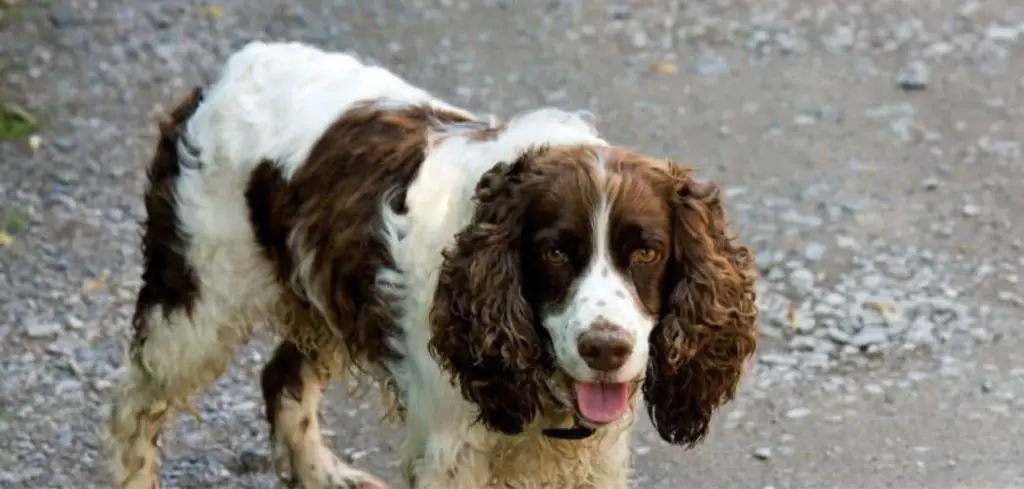Dogs experiencing constant diarrhea can quickly become weak, dehydrated, and distressed.
This symptom can point to a range of underlying health issues, from digestive upset to more serious conditions.
We outline the common reasons for constant diarrhea in dogs, what you can do at home, and when to seek veterinary help.
Dog Constantly Has Diarrhea — Why It Happens
Frequent diarrhea in dogs usually signals that something is wrong with the digestive system or overall health. It can result from dietary indiscretions, food allergies, intestinal parasites, infections, or chronic illnesses like inflammatory bowel disease. In some cases, diarrhea may indicate liver disease, kidney issues, or even cancer.
Constant diarrhea should never be dismissed because it can lead to dangerous dehydration and can be a sign of something more serious going on internally.

Dog Constantly Has Diarrhea: Common Causes
Dietary Indiscretion
Dogs are notorious for getting into things they shouldn’t. Eating spoiled food, garbage, or foreign objects can irritate the stomach and intestines. This often results in sudden, repeated episodes of diarrhea.
Owners may also notice vomiting, lethargy, or a bloated belly if their dog ate something inappropriate.
While some cases resolve, frequent episodes can point to ongoing exposure or a more sensitive digestive system.
Read more: Dog Constantly Throwing Up (What it means)
Food Allergies or Sensitivities
Certain ingredients in a dog’s diet, such as beef, chicken, wheat, or dairy, can trigger chronic diarrhea.
Allergic reactions inflame the gut, making digestion painful and irregular. Dogs with food allergies might also show signs of itchy skin, ear infections, or excessive licking.
Persistent diarrhea linked to diet requires identifying and removing the problematic ingredient through a veterinarian-guided elimination trial.
Intestinal Parasites
Parasites like giardia, hookworms, roundworms, and whipworms are common culprits of diarrhea.
These organisms disrupt normal digestion and cause inflammation in the intestines. Puppies and dogs in shelters or boarding facilities are especially vulnerable.
Dogs with parasites may also lose weight, appear bloated, or pass mucus or blood in their stool. Left untreated, parasitic infections can severely weaken a dog.
Bacterial or Viral Infections
Pathogens such as salmonella, parvovirus, or coronavirus can attack the digestive system.
These infections often cause severe diarrhea, sometimes accompanied by vomiting, fever, and lethargy. Parvovirus in particular can be life-threatening, especially in puppies.
Because infections spread quickly, constant diarrhea combined with other symptoms warrants immediate veterinary evaluation.
Inflammatory Bowel Disease (IBD)
IBD is a chronic condition where a dog’s immune system overreacts to the contents of the gut, leading to ongoing inflammation.
Dogs with IBD often have persistent diarrhea, weight loss, and difficulty maintaining proper nutrition.
Unlike short-term stomach upset, this condition doesn’t resolve without long-term management and veterinary care.
Dogs may require prescription diets or medications to reduce inflammation and restore balance.
Organ Dysfunction (Liver or Kidney Disease)
When organs like the liver or kidneys are not functioning properly, toxins build up in the body and affect digestion.
Diarrhea can become a constant problem, along with vomiting, weight loss, and changes in appetite.
In older dogs especially, chronic diarrhea paired with other systemic signs may indicate underlying organ disease that needs thorough diagnostic testing and treatment.
What to Do If Your Dog Is Constantly Having Diarrhea
If your dog is experiencing constant diarrhea, it’s important to act quickly but calmly. Start by withholding food for a short period (no more than 12 hours) to give the gut a chance to rest. Always keep fresh water available to prevent dehydration.
Switching temporarily to a bland diet of plain boiled chicken and rice can sometimes soothe the digestive system.
Make sure to introduce food slowly and watch closely for any signs of improvement or worsening. If your dog is otherwise acting normal, mild cases may improve within a day or two.
Probiotics designed for dogs can help restore healthy gut bacteria. Avoid giving human medications unless specifically directed by a veterinarian, as some can be toxic to dogs.
Always keep in mind that constant or recurring diarrhea is not normal and usually needs professional medical attention.
When to Call or Visit Your Vet
You should contact your veterinarian if diarrhea persists for more than 24–48 hours, especially if it is constant.
Immediate veterinary care is necessary if your dog shows additional concerning signs such as vomiting, blood in the stool, loss of appetite, lethargy, or weight loss.
Puppies, senior dogs, and those with pre-existing health conditions are at higher risk of rapid dehydration and complications, making early treatment essential.
Diarrhea that appears black or tar-like can indicate internal bleeding, which is a medical emergency.
Any time a dog’s diarrhea is paired with severe weakness, collapse, or refusal to drink water, emergency care should be sought right away. The sooner a veterinarian can identify the cause, the sooner your dog can begin receiving proper treatment.
Read more: Dog Constantly Trying To Pee (Why it happens and what to do)
Key Takeaway
Constant diarrhea in dogs should never be ignored. While mild stomach upset can happen, ongoing or severe diarrhea often points to parasites, infections, food sensitivities, or chronic health issues.
At-home care may provide short-term relief, but veterinary evaluation is crucial to uncover the true cause.
By acting quickly, keeping your dog hydrated, and seeking professional guidance, you can help your dog recover and prevent complications.
Trust your instincts — if your dog constantly has diarrhea, it’s time to call your vet and ensure their health is protected.
